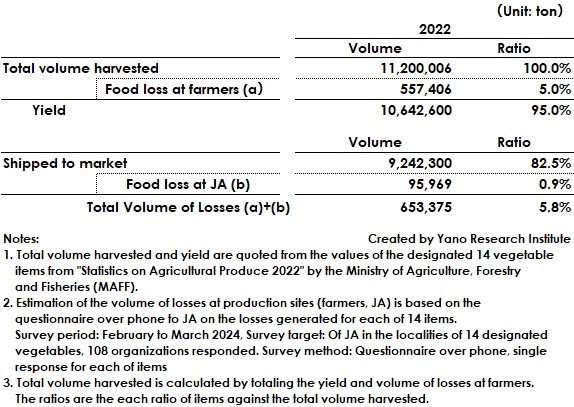No.3558
Food Loss Reduction Initiatives by Enterprises in Japan: Key Research Findings 2024
Food Loss Reduction Initiatives in Progress in Each Stage of Food Supply Chain
Yano Research Institute (the President, Takashi Mizukoshi) has extensively surveyed and analyzed not only the food industry but also the peripheral companies on the status of and the environment surrounding food loss reduction and has found out the whole picture of initiatives to diminish food losses in Japan. Here highlights the total volume of designated 14 items of vegetable losses at production sites (farmers, within Japan Agricultural Cooperatives).

Summary of Research Findings
With the Food Loss Reduction Promotion Act in effect in 2019, Japan aims to halve the volume of food losses by FY2030 from what produced in FY2000. Therefore, many efforts have been considered and taken in production systems, manufacturing processes, ingenuity in package materials, technological innovations, etc. at each stage of food supply chain from production to retailing.
In recent years, there are some moves by startups to solve food loss issues as business (to earn profits) and some major companies from different industries entering the market. Such moves have been developed into various approaches, such as platform business connecting consumers with food that have passed sales period or that is waiting to be discarded, or supply-and-demand matching through demand forecasting system, upcycling waste food ingredients, etc.
A variety of directions are observed in food loss solution business, but it can be roughly categorized into following two: Initiatives of not to generate any losses, and initiatives to effectively utilize the waste merchandises. For the former, there are service types of "food loss control" that prevents from producing too much by controlling supply and demand, or of "prolonging the preservation period" that extends the preservation period of raw materials and merchandises. For the latter, there are service types of "food loss application" that makes waste materials reborn into other products, or of "food loss sharing and matching" that makes a match between consumers and food that is to be discarded. Efforts to reduce food losses have potential of producing fruitful results in the environmental, social, and economic perspectives, and are expected to play an important role in realizing sustainable society for the future.
Noteworthy Topics
Estimated Volume of “Hidden Food Losses” at Production Sites
The volume of food losses estimated by the government includes food waste from businesses such as at manufacturing and food service, and leftovers thrown away from households. Meanwhile, the statistics does not include food losses generated at production sites such as imperfect vegetables produced at farmers or within Japan Agricultural Cooperatives (JA). We conducted a questionnaire over telephone to JA at production localities (108 organizations) of 14 designated vegetables from February to March 2024, thereby to estimate the volume of “hidden food losses” of 14 designated vegetables at production sites.
The estimated volume of 14 designated vegetable food losses totaled at 653,375 tons in 2022, about 5.8% of the total volume harvested. The details were as follows: 557,406 tons for mainly imperfect vegetables that were discarded because of not having fit the standards in size, color, or shape and having not been able to be consumed within farmers, and 95,969 tons for those shipped at farmers and brought to JA but discarded there, or those that were returned to JA after being shipped.
Research Outline
2.Research Object: Companies that provide services related to food loss reduction, food related companies (manufacturers, wholesalers, retailers, restaurant operators), etc.
3.Research Methogology: Face-to-face interviews (including online) by expert researchers, surveys via telephone, questionnaire to enterprises, and literature research
Food Loss
Food loss is, among food waste, those that have been discarded though edible.
<Products and Services in the Market>
Nonstandard fresh food, waste food
Published Report
Contact Us
The copyright and all other rights pertaining to this report belong to Yano Research Institute.
Please contact our PR team when quoting the report contents for the purpose other than media coverage.
Depending on the purpose of using our report, we may ask you to present your sentences for confirmation beforehand.